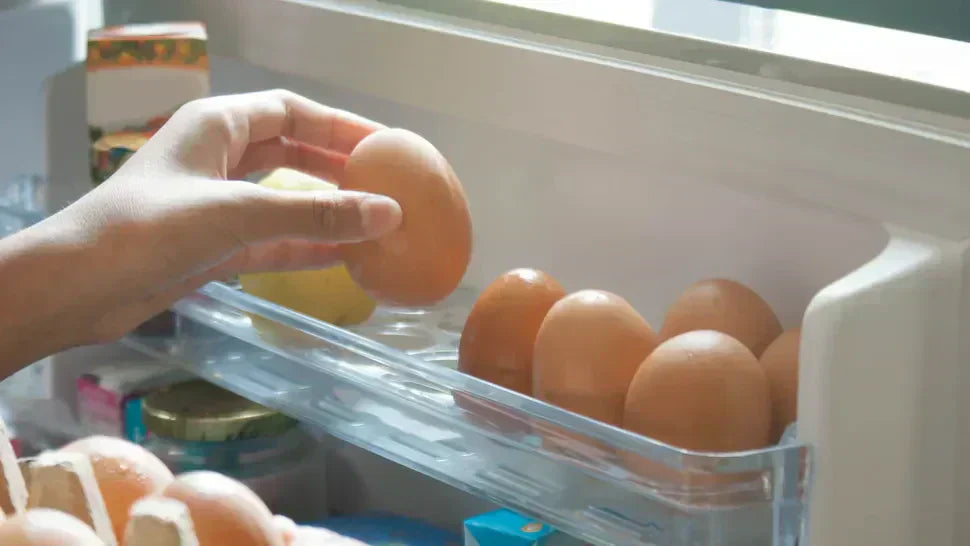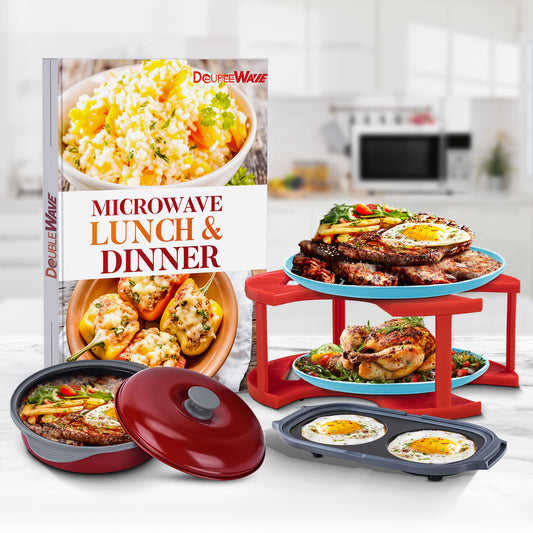
Do you refrigerate fresh eggs? Bloom, Storage Tips, and Shelf Life
Do You Refrigerate Fresh Eggs? Fresh eggs with the bloom intact can be kept at room temperature for a short period (up to a week), but if you’re unsure or the eggs are more than a week old, refrigeration is recommended.
- Fresh eggs (with the bloom intact): If you’ve collected eggs directly from your backyard chickens or a local farm, you don’t need to refrigerate them immediately. The natural protective coating, called the bloom, helps protect the eggs from bacteria and moisture loss, allowing them to be safely stored at room temperature for up to a week. Just keep them in a cool, dry place, away from direct sunlight.
- If eggs are older or you're unsure: If you're not going to use fresh eggs within a week, or if you live in a warm climate where the temperature fluctuates, it's safer to refrigerate them. Refrigeration will extend their shelf life and prevent spoilage.
- Store-bought eggs: These eggs are usually washed, which removes the bloom, and they need to be kept in the fridge for safety.

Microwave Egg Cooker | Non-Stick Egg Fryer & Poacher | Make Egg McMuffin, Eggwich, Breakfast Sandwiches & Hamburger Patties
What Is the Bloom?
The bloom (also called the cuticle) is a natural protective coating found on the outer shell of fresh eggs. This thin, waxy layer acts as a barrier against bacteria and helps seal in moisture, preventing the egg from drying out. The bloom is an important defense mechanism that helps preserve the egg's freshness and protects it from contamination during storage. However, it’s important to note that the bloom can be removed if the eggs are washed, which is common in commercial egg production.
Fresh Eggs vs. Store-Bought Eggs
What Are Fresh Eggs?
Fresh eggs typically come from local farms or backyard chickens. These eggs are often unwashed, which means they still have their natural bloom intact. The bloom provides a protective barrier against contaminants and helps maintain the egg's freshness for a short period.
Storage: Since fresh eggs have the bloom, they can be stored at room temperature for a period of time (up to one week), as the bloom helps keep bacteria out and moisture in. This makes them a bit more forgiving in terms of storage compared to store-bought eggs.
Benefits: The presence of the bloom means that fresh eggs can retain their quality without needing refrigeration, making them ideal for short-term storage. You can keep them in a cool, dry place away from direct sunlight without worrying about spoilage for several days.
What Are Store-Bought Eggs?
Store-bought eggs, on the other hand, are typically washed and processed before being sold. During this process, the natural bloom is removed, which eliminates the egg's natural defense against bacteria and moisture loss.
Need for Refrigeration: Because store-bought eggs no longer have the protective bloom, they need to be refrigerated immediately after collection to maintain safety and prolong shelf life. Refrigeration slows bacterial growth and keeps the eggs from spoiling as quickly, allowing them to last much longer compared to fresh, unwashed eggs.
Shelf Life: Store-bought eggs, which are often sold with a "sell-by" date, are generally kept at a consistent, cool temperature throughout the supply chain to preserve their quality. The refrigeration ensures the eggs remain safe and fresh for a longer period, typically up to 3-5 weeks.
Should You Refrigerate Fresh Eggs?
The decision to refrigerate fresh eggs largely depends on when they were laid, how long you plan to keep them, and the climate you live in. Here’s a breakdown of when to store fresh eggs at room temperature and when refrigeration is necessary.
When to Keep Fresh Eggs at Room Temperature?
Fresh eggs, particularly those that are laid within the last few days, can be safely stored at room temperature for a short period, typically up to a week. This is possible because they still have their natural bloom intact, which provides protection against bacteria and moisture loss.
Ideal Conditions: For optimal storage, keep the eggs in a cool, dry place away from direct sunlight. A countertop or kitchen shelf in a room that stays at a steady, moderate temperature (around 60–70°F/15–21°C) is perfect.
Short-Term Storage: Storing fresh eggs at room temperature is ideal when you plan to use them quickly, within a few days to a week. Since the bloom is intact, the eggs are protected from contamination, and the quality of the eggs remains high for this short storage period.
When to Refrigerate Fresh Eggs?
Refrigeration becomes necessary for fresh eggs in two main situations:
If the eggs won’t be used within a week:
Fresh eggs will stay good for about 7 days at room temperature. However, if you're not able to use them within this timeframe, it's best to refrigerate them to ensure they stay fresh longer. Refrigeration helps to slow down spoilage and prevents the growth of bacteria like Salmonella.
The cool environment of a fridge also helps preserve freshness and prevent the eggs from deteriorating due to moisture loss and changes in temperature.
If you're in a warm climate:
In hot or humid climates, where temperatures frequently rise above 70°F (21°C), refrigeration is essential. Higher temperatures can cause the eggs to spoil quickly even with the bloom intact. The bloom offers some protection, but it is not enough to keep the eggs safe in warmer environments for extended periods.
Bacterial growth is accelerated in warmer climates, and the eggs are more likely to lose quality or become unsafe if left at room temperature for too long. Refrigerating eggs in these conditions is the safest option to extend their shelf life and prevent foodborne illness.
Storing Eggs in the Fridge
Storing fresh eggs properly in the fridge can significantly extend their shelf life and help maintain their freshness. Here’s a detailed look at the best practices for storing eggs in the refrigerator.
How to Store Eggs in the Fridge?
The way you store eggs in the fridge is crucial to maintaining their quality and freshness. Follow these steps for optimal storage:
Use the Original Carton: Always store your eggs in their original carton. The carton helps to protect the eggs from absorbing strong odors and flavors from other foods in the fridge. Eggs have a porous shell, which means they can absorb smells from surrounding items. Keeping eggs in their carton helps prevent this.
Store in the Coldest Part of the Fridge: The coldest part of the fridge is typically at the back, away from the door. This is because the temperature near the fridge door fluctuates more due to frequent opening and closing. By storing eggs in the back, you ensure they stay at a consistent, cold temperature, which slows down aging and helps prevent bacterial growth.
Shelf Life of Refrigerated Eggs
Refrigerating fresh eggs helps extend their shelf life significantly compared to room temperature storage. Under proper conditions, fresh eggs stored in the fridge can last anywhere from 3 to 5 weeks.
3-5 Weeks: Eggs that are stored properly in the fridge will maintain their quality for 3 to 5 weeks from the day they were collected. While the eggs may still be safe to eat after this period, they may not be as fresh, and the texture could change (e.g., whites becoming thinner or yolks less firm).
Egg Expiry: Eggs typically have a “sell-by” or “use-by” date on the carton, which can be a helpful guideline for freshness. However, eggs can often be good for a little while past this date as long as they’ve been properly stored in the fridge.
How to Check Freshness?
If you’re unsure whether an egg is still fresh, you can use the water test. This is a simple and effective method to check the freshness of eggs that have been stored in the fridge.
The Water Test:
- Fill a bowl with water and gently place the egg in it.
- Fresh eggs: Fresh eggs will sink to the bottom and lay flat on their side.
- Slightly older eggs: Eggs that are a few weeks old may stand upright or float slightly, but they are still safe to eat.
- Bad eggs: If an egg floats to the top of the water, it’s a clear sign that it’s no longer fresh and should be discarded. This happens because the egg’s contents shrink as it ages, creating air pockets inside, which causes it to float.
Factors That Affect Freshness
The climate and temperature of your environment have a major impact on how eggs should be stored. Understanding how temperature affects egg freshness is key to preventing spoilage and maintaining quality.
Warm Weather: In hot and humid climates, where temperatures regularly exceed 70°F (21°C), eggs are more prone to bacterial growth and spoiling quickly. In such conditions, eggs should always be refrigerated to prevent bacteria from multiplying and to extend their shelf life. The warm environment breaks down the protective bloom more quickly, making refrigeration essential for food safety.
Cooler Climates: In cooler climates, where temperatures generally stay below 70°F (21°C), eggs can safely be stored at room temperature for several days (up to a week). In these conditions, the bloom remains effective, and the eggs remain safe without needing refrigeration. If your home has a consistent, cool temperature, room temperature storage can be a good option for short-term egg storage.
Room Temperature Storage: If you live in a moderate climate where the temperature does not fluctuate too much, it is generally safe to store eggs at room temperature in a cool, dry place, away from sunlight. The bloom’s protective properties will help keep the eggs fresh without refrigeration for up to a week.
Risks of Improper Storage
Spoilage & Bacteria Growth: Improper egg storage, especially at room temperature, increases the risk of Salmonella and other bacteria, leading to spoilage and foodborne illness.
Room Temp Beyond a Week: Storing eggs at room temperature for more than a week can cause them to lose quality and become unsafe. Bacteria grow faster in warm conditions, making refrigeration crucial after this time.
Signs of Spoilage: Eggs showing off smells, cracks, or floating in water should be discarded, as these are signs they are no longer fresh and may pose a health risk.
Conclusion
In summary, proper egg storage is essential to maintaining both freshness and safety. Eggs with their natural bloom can be kept at room temperature for a short time, but if you're unsure or the eggs are past their prime, refrigeration is the safest option. Whether stored at room temperature or in the fridge, always handle eggs with care and check for signs of spoilage. And for those looking to enjoy quick, perfectly cooked eggs, a microwave egg cooker is a great investment. It allows you to prepare eggs in minutes, ensuring your eggs are fresh, safe, and ready to enjoy whenever you need them.
Frequently Asked Questions
Can You Refrigerate Fresh Eggs Right After Collection?
Yes, it's fine to refrigerate fresh eggs right after collection. However, if they are clean and freshly laid, storing them at room temperature for a short time (up to a week) is also okay.
Can Eggs Be Stored at Room Temperature After Being Refrigerated?
It's best to keep eggs consistently in one place, either room temperature or the fridge, to maintain their quality. Moving them between the two can affect their freshness








